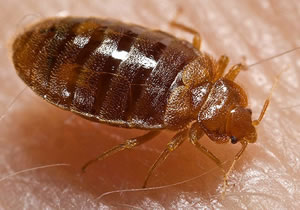
Bed Bugs : What are They and How to Keep Them Out of Your Home

No one wants uninvited guests in your bed. Let alone small, bitey guests who don't know when to leave....!
With international outbreaks of these little pests on the rise we thought a quick blog on bed bugs and how to keep them at bay would be a good idea. Read on to get the full lowdown on the tiny terrors and the best ways to keep them out of your home, (and try not to itch...!).
Why are bed bugs in the news?
As reported by BBC news and many other news outlets, France is currently contending with a massive bed bug infestation. In recent years infestations have become more common place, mainly due to factors such as increased international travel and bed bugs themselves becoming pesticide resistant. Paris has suffered a real outbreak with bugs spotted in public spaces such as cinemas and on public transport.
What is a bed bug?
A bed bug is a small, reddish-brown insect that feeds on the blood of humans and animals. These nocturnal pests are often found in and around sleeping areas, hiding in cracks, crevices, and bedding during the day and emerging at night to feed. Bed bugs can cause itchy bites and are known for their resilience and ability to infest homes rapidly. Their flattened, oval-shaped bodies make it easy for them to hide in tight spaces, making them a challenging pest to eliminate.
How to protect against bed bugs.
Bed bugs are stealthy and tenacious. Once they infest your home, getting rid of them can be a challenging and costly process. The key to avoiding this nightmare scenario is prevention. Read on to explore effective strategies to protect your home against bed bugs.
1. Educate Yourself:
Knowledge is your first line of defense. Learn about bed bugs, their appearance, behavior, and common hiding spots. Awareness is crucial for early detection.
2. Be Cautious When Traveling:
Bed bugs often hitch rides on luggage or clothing. Inspect hotel rooms and accommodations for signs of bed bugs before settling in. Use luggage racks or stands instead of placing bags on the floor or bed.
3. Regularly Inspect and Clean Your Home:
Conduct routine inspections of your home, paying close attention to bedrooms, couches, and other sleeping areas.
Wash and dry bedding, curtains, and clothing at high temperatures to kill any potential bed bugs.
Vacuum carpets, mattresses, and upholstery regularly, and dispose of the vacuum bag in a sealed plastic bag.
4. Use Mattress and Pillow Protectors / Encasements:
Invest in high-quality mattress and pillow encasements designed to prevent bed bugs from infesting your bedding.
Ensure encasements are securely zipped shut to trap any existing bed bugs inside. If you cant afford these, regularly changing and washing mattress protectors can effectively remove bed bugs and any larvae.
5. Reduce Clutter:
Declutter your home, especially in bedrooms. Fewer hiding spots make it easier to spot bed bugs.
Consider storing belongings in plastic containers with sealed lids.
6. Seal Cracks and Crevices:
Bed bugs often hide in cracks, seams, and crevices. Seal gaps in walls, floorboards, and furniture to eliminate potential hiding spots.
7. Check any Second hand Furniture:
Be cautious when acquiring used furniture, especially mattresses and upholstered items. Inspect them thoroughly before bringing them into your home.
9. Be Wary of Shared Spaces:
In communal living situations, such as dormitories or apartments, be vigilant. Bed bugs can move easily between units.
Use protective measures when moving into a new residence, such as checking for signs of bed bugs and sealing any cracks or gaps.
10. Regularly Check for Signs:
Learn how to identify signs of a bed bug infestation, including small reddish-brown bugs, shed exoskeletons, and tiny dark fecal spots. If you suspect an infestation, take immediate action to address it. Do not delay treatment.
11. Seek Professional Pest Control:
If you do discover a bed bug infestation we recommend contacting a licensed pest control professional immediately. DIY treatments often worsen the problem and an experienced professional will have all the up to date pesticides and tools to tackle the problem quickly and efficiently.
How do you treat bed bug bites?
Treating a bed bug bite can help alleviate discomfort and reduce the risk of infection. Here are steps to treat a bed bug bite:
- Wash the Area: Gently clean the affected area with mild soap and water to reduce the risk of infection. Pat the area dry with a clean cloth.
- Apply an Antiseptic: Dab on a mild antiseptic or over-the-counter antibiotic ointment to the bite to prevent infection.
- Reduce Itching: Over-the-counter anti-itch creams or corticosteroid creams can help reduce itching and inflammation. Follow the product instructions for application.
- Oral Antihistamines: If the itching is severe, consider taking an oral antihistamine, like diphenhydramine (Benadryl). Be sure to follow the recommended dosage.
- Avoid Scratching: It's essential to resist the urge to scratch the bite, as scratching can break the skin and lead to infection.
- Cold Compress: Applying a cold compress or ice pack wrapped in a cloth to the bite for about 15 minutes can help reduce itching and swelling.
- Keep the Area Clean: Maintain good hygiene to prevent infection. Wash the bite gently daily and reapply antiseptic or ointment as needed.
- Monitor for Signs of Infection: Keep an eye on the bite for any signs of infection, such as increased redness, swelling, warmth, or pus. If you suspect an infection, consult a healthcare professional.
- Consult a Doctor: If you experience a severe allergic reaction to the bite, such as difficulty breathing, swelling of the lips or throat, or a widespread rash, seek immediate medical attention.
Do bed bugs carry diseases?
Bed bugs are not known to carry or transmit diseases in the same way that some other pests, like mosquitoes or ticks, can transmit diseases. While bed bug bites can be uncomfortable and lead to itching, redness, and swelling, they are generally not considered a significant health threat.
However, it's important to note that bed bug bites can lead to secondary infections if scratched excessively, leading to broken skin and potential bacterial infections. Additionally, some individuals may have allergic reactions to bed bug bites, which can cause more severe symptoms.
The primary concern with bed bugs is the psychological and emotional distress they can cause due to their presence and the difficulty of eradicating them from an infested area. Bed bug infestations can disrupt sleep and daily routines, leading to stress and anxiety.
Protecting your home against bed bugs requires a combination of vigilance, education, and preventive measures. By staying informed, maintaining a clean and clutter-free environment, and being cautious when traveling or acquiring secondhand items, you can significantly reduce the risk of bed bug infestations. Remember that early detection and swift action are crucial if you suspect bed bugs have invaded your home.
Have you had any experience of bed bugs at home or abroad? If you have any further tips or any questions for us please leave them in the comments below.
 UK Manufactured Plain & Patterned Duvet Sets in a massive range of colours and fabrics.
UK Manufactured Plain & Patterned Duvet Sets in a massive range of colours and fabrics.
 Protect yourself and your mattress from spills, dirt & allergens with our superior protectors. Available in Quilted and TENCEL fabrics.
Protect yourself and your mattress from spills, dirt & allergens with our superior protectors. Available in Quilted and TENCEL fabrics. Valance and bed frills made to fit any size of bed.
Valance and bed frills made to fit any size of bed.  Sleep the day away in a beautifully soft duvet.
Sleep the day away in a beautifully soft duvet. 

-min-1731x552.png)









